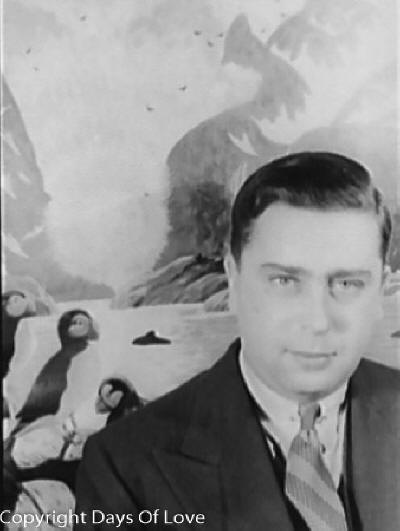

Partner Carter Lodge
Queer Places:
City, University of London, Northampton Square, Clerkenwell, London EC1V 0HB, Regno Unito
Coachella Valley Cemetery, Palm Desert, California 92211, Stati Uniti
 John
William Van Druten (1 June 1901 – 19 December 1957) was an English playwright
and theatre director, known professionally as John Van Druten. He began his
career in London, and later moved to America becoming a U.S. citizen. He was
known for his plays of witty and urbane observations of contemporary life and
society.
John
William Van Druten (1 June 1901 – 19 December 1957) was an English playwright
and theatre director, known professionally as John Van Druten. He began his
career in London, and later moved to America becoming a U.S. citizen. He was
known for his plays of witty and urbane observations of contemporary life and
society.
Van Druten was born in London in 1901, son of a Dutch father, Wilhelmus van Druten and his English wife Eva. He was educated at University College School and read law at the University of London. Before commencing his career as a writer, he practised law for a while as a solicitor and university lecturer in Wales.
He first came to prominence with Young Woodley, a slight but charming study of adolescence, which was produced in New York in 1925. However, it was initially banned in London by the Lord Chamberlain's office due to its then controversial portrayal of a schoolboy falling in love with his headmaster's wife. In Britain, it was first produced privately (by Phyllis Whitworth's Three Hundred Club) and then at the Arts Theatre in 1928. When the ban was lifted, it had a successful run at the Savoy Theatre in the West End with a cast including Frank Lawton, Derrick De Marney, and Jack Hawkins. The play was filmed twice. It was revived at the Finborough Theatre, London, in 2006.
He was one of the most successful playwrights of the early 1930s in London, with star-studded West End productions of his work including Diversion (1928), After All (1929), London Wall (1931) with Frank Lawton and John Mills, There's Always Juliet (1931), Somebody Knows (1932), Behold, We Live (1932) with Gertrude Lawrence and Gerald du Maurier, The Distaff Side (1933), and Flowers of the Forest (1934).
He later emigrated to America, where he wrote Leave Her to Heaven (February 1940), a drama set in London and Westcliff-on-Sea in Essex, which was shortly followed by major successes with Old Acquaintance (NY December 1940 – May 1941 and London with Edith Evans) and The Voice of the Turtle (1943), which ran for three seasons in New York and was filmed with Ronald Reagan.
Van Druten wrote Gaslight for George Cukor in 1944, a brilliant study of paranoid terror, and then adapted his own stage success, The Voice of the Turtle (1947), directed by Irving Rapper and starring Eleanor Parker and Ronald Reagan. It offers a rather unorthodox take on sex, with an implicit refusal to condemn promiscuity.
In 1944, van Druten became a naturalised citizen of the United States. His play, Make Way for Lucia (1948), based on the Mapp and Lucia novels of E. F. Benson, was premiered in New York and had its first professional British production in 1995.[1]
His 1951 play I Am a Camera, together with Christopher Isherwood's short stories, Goodbye to Berlin (1939), formed the basis of Joe Masteroff's book for the Kander and Ebb musical, Cabaret (1966). When I Am a Camera opened on Broadway in 1951, The New York Times drama critic Walter Kerr wrote a famous three-word review: "Me no Leica."
In the late 1930s and early 1940s he was in a relationship with Carter Lodge (died 1995). Lodge was the manager of the AJC Ranch that van Druten, British actress Auriol Lee and Lodge bought together in Coachella Valley. When the relationship ended, Lodge continued to live on the ranch with his new partner, Dick Foote. When van Druten died in 1957, he left the entire property of the ranch to Lodge and also the rights in his work, including "I Am a Camera", which entitled Lodge to earn a percentage from the movie "Cabaret".[2]
He died at Indio, California, on 19 December 1957 of undisclosed causes. He is buried in the Coachella Valley Public Cemetery.[3]
My published books: